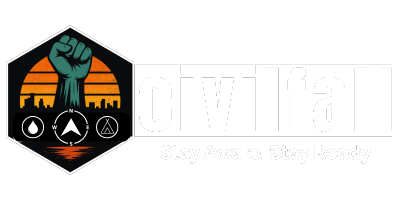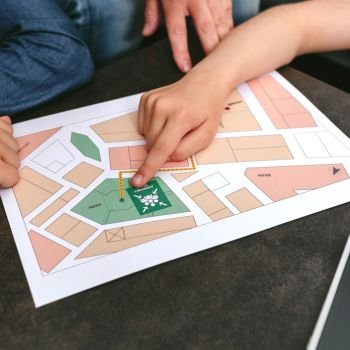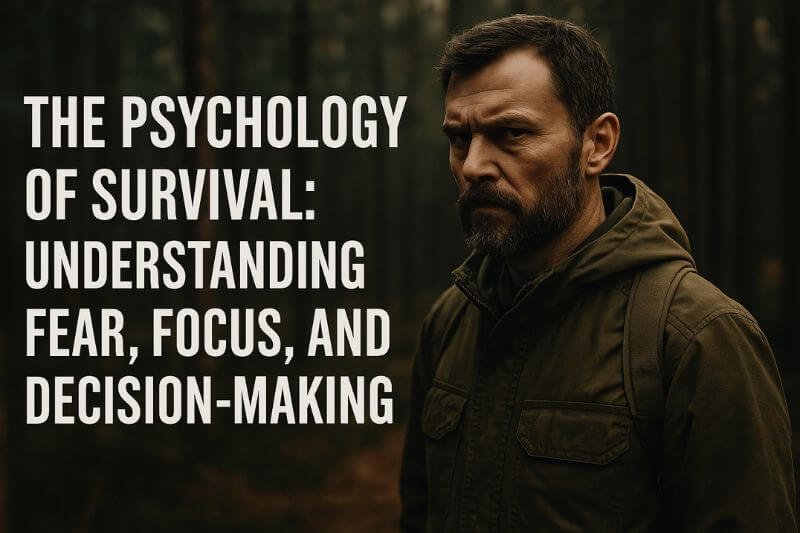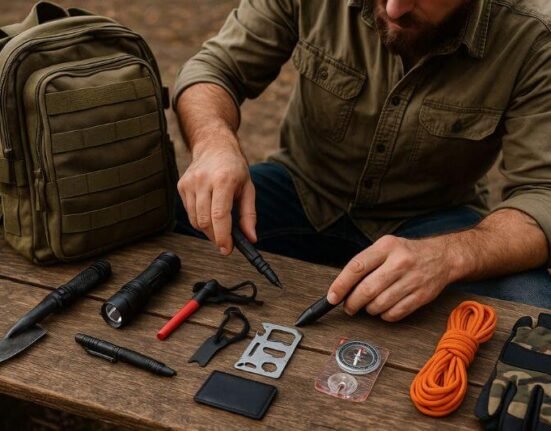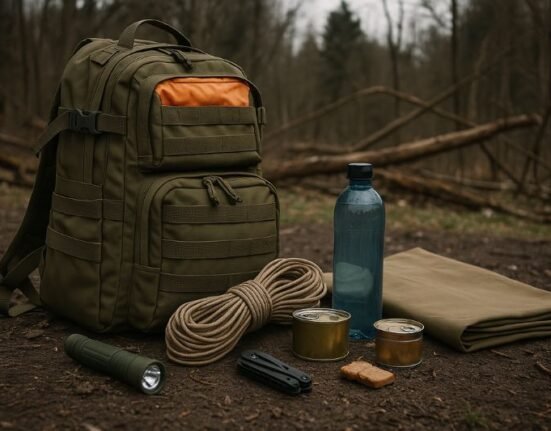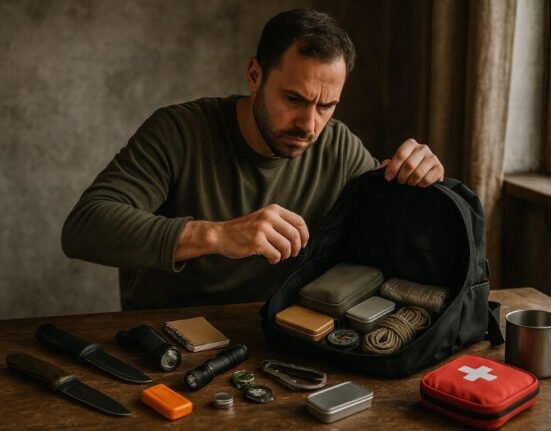In a true survival scenario, it’s not your gear, strength, or even skills that decide your fate — it’s your mind.
Understanding survival psychology gives you the most important advantage when systems break down: control over your thoughts, your fears, and your decisions.
Panic, tunnel vision, indecision, emotional collapse — these are all natural reactions. But with training, they can be managed and even reversed.
Why psychology matters more than tools in a crisis
The best equipment in the world is useless in the hands of someone frozen by fear.
Likewise, someone with limited resources but clear focus and calm reflexes can outlast far more “prepared” individuals.
“Survival is 90% mental. Your mindset determines your outcome before your environment does.”
— CivilFall Cognitive Survival Doctrine
Survival psychology is the study of how humans react under life-threatening stress.
And the truth is, most people aren’t ready.
Not physically. Not logistically. And certainly not psychologically.
The stages of psychological response to extreme events
Survival psychologists have identified distinct mental phases that people go through in a major crisis.
Understanding them allows you to spot warning signs — and take back control.
Stage 1: Denial
The most dangerous stage. People often refuse to believe what’s happening.
They delay action. They downplay threats. They look for normality in a collapsing system.
This stage kills.
Stage 2: Disorganization
Once reality sets in, emotions spike. People panic, freeze, or overreact.
The brain’s limbic system takes over, shutting down logic.
Common signs:
- Pacing without direction
- Repeating useless actions
- Asking “what should we do?” repeatedly
- Emotional bursts or breakdowns
Stage 3: Focus
If the person is mentally trained or supported by someone who is, the brain shifts into task mode.
This is where the prefrontal cortex activates again — and survival actions begin.
Breathing slows. Eyes focus. Plans form. Priorities emerge.
The faster you can move from Stage 2 to Stage 3, the higher your survival chances.
How fear affects the brain in collapse situations
Fear isn’t the enemy. Mismanaged fear is.
In a survival event, fear triggers the fight, flight, or freeze reflex.
Your heart rate spikes. Blood rushes to muscles. Vision narrows. Fine motor skills degrade.
That’s not a bug — it’s evolutionary design. But it can cost you everything if unchecked.
Fear reactions to watch for:
- Shaky hands when trying to use gear
- Voice pitch rising or trembling
- Feeling mentally “foggy”
- Hyperfocusing on irrelevant details
- Loss of time perception
Knowing these signs lets you interrupt the spiral early.
The concept of “Psychological Resilience”
Survival isn’t just about avoiding panic — it’s about bouncing back quickly and functionally.
That’s called psychological resilience. It’s your brain’s ability to:
- Take hits
- Adapt to changing conditions
- Recover its clarity
- Maintain emotional balance under chaos
Like a muscle, this trait strengthens with training and exposure.
“Mental recovery is the most underrated survival skill.”
— WHO Report on Psychological Resilience in Disaster Zones
Internal vs external triggers of collapse reactions
Not all breakdowns come from what’s around you. Some come from inside you.
External triggers:
- Explosions
- Screaming crowds
- Seeing injured people
- Flashing lights or alarms
Internal triggers:
- Childhood trauma being reactivated
- Guilt from not reacting “fast enough”
- Self-doubt or shame
- Memory of past crisis moments
A survivalist doesn’t just prepare gear. He prepares his mind to meet these triggers without folding.
Training Your Brain for Survival: Practical Tools to Strengthen Focus and Response
You can’t eliminate fear. But you can train your brain to work with it instead of being dominated by it.
The psychology of survival isn’t just theory. It’s something you can build — with drills, habits, and targeted challenges.
Use stress exposure as a daily mental workout
Controlled discomfort conditions your nervous system to perform better under chaos.
You don’t need a disaster to begin. Start with small, low-risk stressors that challenge emotional control:
- Cold showers
- Fasting for 16–24 hours
- Sleeping without a pillow or mattress
- Speaking in front of strangers
- Navigating without your phone
These might seem unrelated — but each trains impulse management, focus, and resilience.
“Adaptability under pressure starts with intentional discomfort.”
— CivilFall Psychological Conditioning Module
Practice the pause-response technique
This simple but powerful mental tool trains your mind to stay rational under emotional pressure.
Step 1: Pause
When you feel fear, tension, or overwhelm, stop for 3–5 seconds.
Don’t act. Don’t move. Don’t speak.
Step 2: Breathe
Inhale slowly. Hold for 2 seconds. Exhale slowly. Repeat twice.
Step 3: Respond
Now that your fight-or-flight response is disarmed, you can act deliberately.
Do this in everyday life (during conflict, deadlines, surprises), and it will become instinctive in a real crisis.
Rewire panic-prone thought loops
The brain is a pattern machine. If panic or indecision is your default, you need to rewrite the code.
Use this journal drill daily:
- Describe a situation where you felt fear or tension
- Write down what your brain said to you
- Reframe the statement into something tactical
- Example: “I don’t know what to do” → “I will focus on what I can control first”
Over time, this practice reshapes your internal survival language.
Train your attention with focus anchoring
In a crisis, attention becomes fragmented. You must train it to hold — to stay fixed where it matters.
Try this exercise:
- Light a candle in a dark room
- Stare at the flame without blinking or thinking for 2 full minutes
- Each time your thoughts wander, note it, then return
This simple task trains visual control, breath regulation, and cognitive centering — all core skills of survival psychology.
Mental mapping and cognitive rehearsal
Survival psychologists use cognitive rehearsal to reduce response time in life-threatening events.
You can do this too — in minutes.
- Choose a scenario (home invasion, flood, EMP)
- Visualize it in real-time, with sound, light, and emotion
- Mentally walk through your response, step by step
- Identify emotional spikes or gaps in your plan
- Rehearse weekly to reinforce familiarity
The more often your brain “experiences” a situation mentally, the less shocked it will be when it becomes real.
The “What-If → So-What” technique
Fear often begins with “What if?”
What if the food runs out? What if I’m alone? What if I freeze?
Instead of suppressing these thoughts, redirect them.
Train yourself to respond: “So what would I do?”
This anchors fear into strategy.
- “What if I lose signal?” → “So I’ll switch to analog backup.”
- “What if I’m injured?” → “So I need to pre-load trauma gear.”
- “What if no one helps?” → “So I’ll lead until help arrives.”
Over time, this trains your brain to treat fear as fuel, not friction.
Emotions as data, not commands
The prepper with the best mindset doesn’t suppress emotion — he interprets it.
- Fear = pay attention
- Anger = boundary crossed
- Sadness = something must be let go
- Guilt = responsibility to own or release
When you treat emotions as incoming signals, not orders, you stay functional. You stay human. And you stay in control.
Applying Survival Psychology in the Field: Mental Tactics That Keep You Alive
Theory becomes life-saving only when it’s applied under pressure.
In the real world — in floods, blackouts, riots, and warzones — the mind becomes the frontline.
This final section explores how survival psychology operates in the heat of chaos, and how trained minds outperform panic-driven behavior.
Real collapse, real mindset failure
During the 2004 Indian Ocean tsunami, many people on the beach stared in confusion as the water receded. Some took photos. Others asked strangers what was happening.
Only a few recognized the signs — and ran. They survived.
Not because they were smarter — but because they were mentally prepared to act on intuition and pattern recognition.
“People don’t die because they don’t know. They die because they hesitate.”
— WHO Case Study, 2005 Tsunami Report
How trained minds behave under sudden shock
When disaster hits, your reactions slow down unless already trained.
But trained survivors instinctively:
- Scan surroundings before moving
- Slow down their breathing
- Reduce verbal chatter
- Focus on one action at a time
- Lead others instead of freezing with them
They aren’t superhuman. They’ve just practiced how to think when the body wants to panic.
Psychological traps that sabotage survival
Certain common mental errors can destroy your ability to respond.
Trap 1: Normalcy bias
“This can’t really be happening.”
“This is probably temporary.”
“This has never happened before — it’ll pass.”
These thoughts delay escape. Delay action. Delay survival.
Trap 2: Fantasy planning
People assume their plan A will work. They imagine an ideal sequence of events.
But in the field, plans fall apart fast.
The prepared mind expects friction, and stays flexible.
Trap 3: Tunnel vision
In panic, people focus too much on one thing — a locked door, a single route, one idea.
This cognitive narrowing can be fatal.
Train your mind to step back. Ask:
“What am I not seeing right now?”
“What else could this be?”
“Who is calm — and what are they doing?”
Teaching the psychology of survival to others
Being mentally prepared isn’t enough — you often need to carry the mindset for your group.
Here’s how:
- Assign one mental anchor role: “You watch for emotional spikes.”
- Establish a team mantra: “One calm breath, then act.”
- Debrief regularly: ask “What worked? What didn’t?”
- Rotate leadership during drills to decentralize dependence
The more you rehearse with your family or prepper group, the more that clarity spreads in real scenarios.
When everything breaks — your mind rebuilds the plan
After a collapse, even if your gear is lost, your routes are blocked, and your comms are down — your mind remains your central tool.
That means:
- Prioritize observation: Watch, listen, assess.
- Rebuild a plan with the 80/20 rule: What few actions get me the most stability?
- Recenter emotionally: “I’m here. I’m thinking. I still have options.”
Your psychology becomes your compass when all systems fail.
Internal resources to reinforce survival thinking
- Survival Mindset: How to Think Clearly When Everything Collapses
- Resilience Training for Crisis: How to Stay Mentally Strong When SHTF
External reference
Final takeaway: The mind is your last safe house
You can lose your bug-out bag. You can be cut off from communication.
But if your mind remains sharp, calm, and resilient — you are not lost.
Survival psychology is not a luxury. It’s your core system. It governs every movement, every decision, every life-saving act.
You don’t need to feel fearless. You need to feel functional.
Train your thoughts like you train your aim. Because in collapse, mental clarity is your most tactical advantage.

